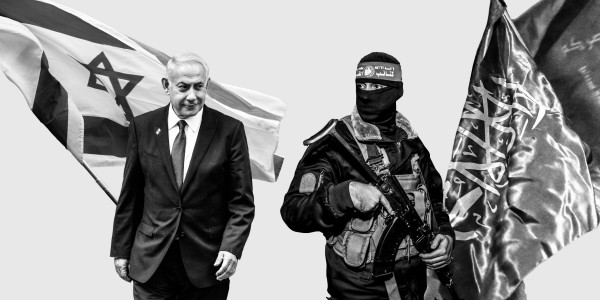Mouin Rabbani interview on "Intercepted" with Jeremy Scahill and Murtaza Hussain of The Intercept, December 2, 2023: it will all be different now  This is the last few minutes of a 69-minute podcast interview with Middle East expert Mouin Rabbani, published under the title "Two Months That Shook the World: The First Phase of the Gaza War"Mouin Rabbani:
This is the last few minutes of a 69-minute podcast interview with Middle East expert Mouin Rabbani, published under the title "Two Months That Shook the World: The First Phase of the Gaza War"Mouin Rabbani: ...I think you very well characterized the initial U.S. response. Then it became clear that this omniscient, omnipotent, unbeatable Israeli military is a very effective killing machine when it’s dropping 2,000-pound bombs from the air, but a rather mediocre fighting force when it comes to ground operations. That it can only make further progress in a context where further regional escalation is a certainty, and I think that those who are most worried about the scenario appear to now have the upper hand. And it’s because of that, that, all of a sudden, you’re hearing, 15,000 corpses later, concern about civilian casualties.
Murtazza Hussain: : With the caveat that we still don’t know what dimensions this war ultimately may take, there may be a regional implication to it as well, as you said. But I’m curious, in terms of the next day after this conflict’s over, how do you see the political horizon of the Israel-Palestine conflict changed by October 7th, and everything that’s happened since then?
Obviously, the level of death and destruction in such a small time frame is unprecedented, even in this long conflict, and it’s going to have lasting impacts on both Palestinian, Israeli, regional, and, also, Western opinion for many, many years to come.
I’m curious, how do you see politics after this conflict? And what may we actually expect, if anything, in terms of seeing a political resolution any time in the foreseeable future?
Mouin Rabbani: Well, I’ll start by getting back to your first question, which is that, on October 6th, the Palestinians were completely marginalized, and Israel and its sponsors in the U.S. and Europe had come to the conclusion that the Palestinians could be safely ignored. And that Israel [can] basically have its way with the Palestinians, and resolve the whole issue unilaterally because, on the one hand, no one cared anymore, and, on the other, the Palestinians were too powerless to do anything about it. That changed on October 7th.
An optimistic scenario would be to recall an incident from the 1970s. In 1971, Israel’s then-defense minister, Moshe Dayan, who was the hero of Israel’s decisive military victory in 1967, was giving a speech and, still full of hubris, he said, you know, if I have to choose, between Sharm El-Sheikh without peace, or peace without Sharm El-Sheikh, and he was referring to a resort in what was then the Israeli occupied Sinai Peninsula. If I have to make this choice, he said, I choose Sharm El-Sheikh without peace.
Two years later, Egypt and Syria launched their joint offensive against Israel to recover their occupied territories, and it caused such a shock within Israeli elites that, by the end of that decade, the Israeli government, then led by the much more radical Likud Party, negotiated a peace agreement with Egypt, part of which gave not only Sharm El-Sheikh, but every last grain of sand in the Sinai Peninsula back to Egypt. And who was a main negotiator of that agreement? Moshe Dayan.
And again, I don’t want to get into the details, but an important reason that Israel concluded its peace treaty was to get a freer hand with the Palestinians, and the colonization of the West Bank and Gaza Strip, and to remove the main Arab military force from the conflict, and so on, but that’s not the point I’m making here.
Then you have Israel’s 1982 invasion of Lebanon, which is known as Operation Peace for Galilee, but its real name was Operation Big Pines. And there, Israel had a very well-developed strategy: you invade Lebanon, you eradicate the PLO, you install Bachir Gemayel, the leader of the fascist Phalangist Party as head of state in Lebanon.
He concludes a peace treaty with Israel, he expels all the Palestinian refugees in Lebanon to Jordan. There is a revolution in Jordan, and it’s transformed from a Hashemite monarchy into a Palestinian republic. That becomes the Palestinian homeland, and Israel can then proceed with the annexation of the West Bank and Gaza Strip. And, eventually, not only the West, but the international community will recognize this.
Well, first of all, Israel eventually proved incapable of seizing West Beirut by military force. It was only able to do so after the U.S. sent a mediator to Beirut to negotiate the orderly withdrawal of the PLO from Beirut. And then, it only took one bomb — an Operation Valkyrie-type operation — to knock off Bachir Gemayel, and the whole plan collapsed.
And then you had, a few years later, the popular uprising, the Intifada, from 1987 to 1993, and the PLO that was supposed to be eradicated in Beirut ended up leading the Palestinians from the occupied territories. And again, this is without getting into any analysis of the Oslo Agreements, but I think the broader point is clear.
But in 1973 there was also another dynamic, which is that Israel — or those Israelis who were most committed to the permanent retention of the occupied territories — began to see the threat of a potential Arab-Israeli peace, and you had groups like Gush Emunim and others that began to very strongly intensify — with full government support I should add — settlement activity in the West Bank and Gaza Strip. So, you have these different dynamics at work.
How will this play out? It’s very difficult to say. On the one hand, I think, when you hear Biden, and E.U. Foreign Affairs Commissioner [Joseph] Borrell, and others, talking about a reinvigorated initiative to achieve a two-state settlement, you can take all that with a grain of salt. Not because a two-state settlement is no longer on the table, but because you can’t have a two-state settlement without an end to the occupation. And, since 1967 — so, now, for over half a century — there is literally not a single instance in which either the United States or Europe have confronted Israel with a single consequence for any of its actions in the occupied territories.
So, this whole process of creeping and now leaping annexation has proceeded without challenge, and has been enabled by, for example, the U.S. and Europe making these settlements economically viable, by allowing them to export their illegal products from their illegal settlements into the European and American markets.
Yes, there have been verbal condemnations and statements, and so on, but in terms of practical consequences? Literally zero. And a world in which Washington or Brussels challenge Israel and take measures to compel Israel to end its occupation, that doesn’t exist, any more than the moon is made out of cheese.
So, my view, and I’m perhaps in a minority here, is that, at least as a theoretical matter, a two-state settlement is entirely achievable, because I don’t believe there is such a thing as a point of no return.
If you compare the West Bank to Algeria, Algeria was internationally recognized as an integral part of the French homeland until 1954 by the entire international community as it existed then. That’s never been the case for Israel and the West Bank. And all it would take is a phone call from Washington and the occupation would end. Again, that’s never going to happen, but you can think of ways in which Western interests in the Middle East are sufficiently challenged, that the U.S. and Europe may begin to change their policies.
So, the issue is not whether there can be a two-state settlement. I think one question we need to ask ourselves in view of what we’ve seen in the past month is whether there should be peace with Israel. And here’s what I mean by that.
If you look at Europe in the 1940s, at a certain point, a conclusion was reached that there could be no peace in Europe without the dismantling of the Nazi regime, because it was a rabid, lunatic, irrational state with whom peace was simply impossible. No one talked about exterminating or expelling the German people, but about dismantling the state and its key institutions.
You go to Southeast Asia in the late 1970s, and a conclusion was reached that, in addition to the expulsion of American forces, peace in Southeast Asia could not be attained without dismantling the rabid, lunatic, thoroughly irrational Khmer Rouge regime. You go to Southern Africa in the 1990s and, similarly, it became apparent that, unless you dismantle the white minority regime in South Africa, peace in Southern Africa would remain a pipe dream.
Now, you look at Israel today. It’s a state that has reached such a degree of irrational, rabid lunacy that its government routinely accuses its closest allies of supporting terrorism. And, in the last week or two alone, Israel has accused the leaders of Spain, Belgium, and Ireland of supporting terrorism for having even the slightest disagreement with it.
You have Israel’s clownish representative to the United Nations, who attends security council meetings wearing a concentration camp outfit, or at least the yellow star, and demanding the immediate resignation of the U.N. Secretary General, whose position … He hasn’t named Israel once as responsible for anything. But he demanded his immediate resignation simply because he made the obvious factual observation that the attacks of October 7th were not the beginning of the history of this conflict, and is demanding resignations left and right.
For Israel, slaughtering 15,000 people in a month, conducting the most intensive bombing in the history of the Middle East — and we’re talking about the Middle East, not Scandinavia — has become perfectly normal. It is a state that has become thoroughly incapable of any form of inhibition. I would argue that the Israeli regime is a clear and present danger to peace in the Middle East, and, rather than drawing any conclusions, rather than or in addition to having a discussion and debate about how Israeli-Palestinian peace might be achieved, we should also be asking ourselves, should that peace be achieved? Or, rather, can it only be achieved by dismantling a regime and its key institutions the way that was done in Europe in the 1940s, in Southeast Asia in the 1970s, in South Africa in the 1990s, Southern Africa in the 1990s, and I’m sure there are other examples as well.
And, just to be clear, I’m not talking about expulsion of Israeli citizens or whatnot. I’m talking about a regime and its institutions. Again, let’s not jump to conclusions, but let’s ask the difficult questions.
 Mouin Rabbani
Mouin Rabbani is co-editor of the Arab Studies Institute’s ezine
Jadaliyya. He is a Dutch-Palestinian Middle East analyst specializing in the Arab-Israeli conflict and Palestinian affairs. He is based in Amman, Jordan and was a Senior Analyst for the International Crisis Group,
Mouin Rabbani discusses post-7 October live





